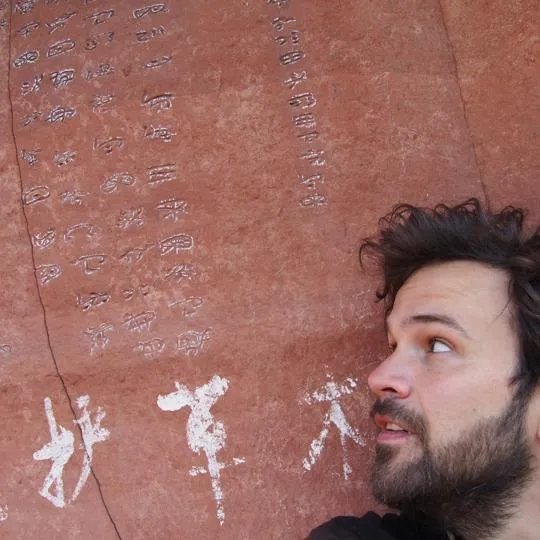
Dr Jan Karlach
Research Associate in Social Anthropology
Biography
After obtaining B.A. and M.A. in Sinology at Charles University in Prague, Jan Karlach successfully pursued Ph.D. in Sociology at The Hong Kong Polytechnic University. During his undergraduate studies, he spent three semesters at the Sichuan University in Chengdu and one semester at The Hong Kong Polytechnic University as an exchange student. Before starting his postgraduate programme, he spent two semesters learning the Nuosu-Yi language at the Xichang College in Liangshan Yi Autonomous Prefecture, Sichuan Province. In the last decade, he conducted several long-term ethnographic fieldworks in Southwest China. Between 2020 and 2023, he worked at the Oriental Institute of the Czech Academy of Sciences as the Lumina Quaeruntur research fellow.
Together with another three team members, he researched the parallels between Chinese ethnic policies and international affairs. As a member of the “Cosmological Visionaries” team, he is researching “Paths of Souls and Corridors of Chinese Scientific Modernization: Visions of Satellites, Railroads, Highways, Power Plants, and the Nuosu-Yi Cosmology” in Liangshan. He works with Nuosu-Yi literati-ritualists and shamans to understand how Chinese economic development and its impact on the local environment is negotiated through the shifting Nuosu-Yi animistic ontology.
Research interests and PhD supervision
- State-driven Modernization and the Animistic Ontology in Southwest China
Since the 1980s, the “China Western Development” project (Xibu Dakaifa) brought unprecedented transformation not only to the everyday cultural and political lives of the local ethnic populations but also to the structures of their societies. Animistic people derive their ontologies from their close relationship with the surrounding natural environment. The railroads, highways, digital infrastructure, and satellites launched from the local facilities, along with the steelworks and power-generating facilities – all converging in the massive Belt and Road Initiative infrastructural and geo-strategical project –, inevitably became integrated into their cosmologies. This relationship between science and animism is complex and often problematic, but it can also be productive. As such, it brings fresh perspectives on the burning questions of adaptation to climatic, cultural and political changes.
- Historical Anthropology of Southwest China
The anthropologists never read enough historical materials, and the historians seldom engage in ethnographic fieldwork. To understand the linguistic, social and cultural landscapes produced by an immensely complex terrain of Southwest China over longue durée, the two disciplines must engage closely with each other and mutually interrogate their respective findings.
- History of Ethnology and Social Sciences in China
Situated research processes within the indigenized disciplines of ethnology and anthropology informed not only the construction of the unified Chinese nation but also carved out the ascribed identities of its minority nationalities. A reflexive understanding of this historical practice is necessary for an analysis of the social landscape of contemporary China. Focusing on its southwestern region, the genesis of the Yi studies (Yixue) represents a remarkable case study of how the elite ethnic scholars proactively entered Chinese nationalistic discourse and simultaneously started to produce discursive spaces, in which they could culturally differentiate themselves from the Chinese ethnic majority and other regional nationalities. Engagement with this continuously evolving situation is a necessary stepping stone for an understanding of the current Chinese affairs, and an appreciation of the major role the social sciences play in this dynamic.
- Everyday Ethnicity and Ethnopolitics in Southwest China
The attitudes towards the top-down state-driven implementation of various (ethnic) policies – from poverty alleviation to the unity of nationalities – differ across regions in China. The local ethnic populations in Southwest China tend to be more accommodating and much less oppositional towards the policies in comparison with larger autonomous regions in the northern and western parts of the country. Moreover, the local ethnic elites use various tactics to localize these policies in their respective regions and shape them according to their needs and sociocultural visions. It is necessary to differentiate each case from the other to understand the nature of contemporary Chinese ethnic policies, their reception by the ethnic populations, and their influence on everyday ethnic identifications.
- Chinese Digital Technologies and Their Culturally-conditioned Everyday Negotiation Among the Ethnic Population of Southwest China
The booming internet industry with all its attributes – smartphones, digital wallets, technologically mediated ways of communication and sharing – arrived in the western part of the People’s Republic of China with a slight delay when compared to its eastern coast. Therefore, its emergence seemed perhaps less transitional and more abrupt. The multifaceted transformation brought by the culturally-conditioned use of technology – the high-speed internet mediated by software and hardware architectures of portable devices – thus keeps emerging as one of the major fields of study for contemporary anthropology.
Teaching
Introduction to Chinese Language and Culture; Past and Present of Chinese Anthropology; Ethnohistory, Ethnicity and Nation-building in Southwest China; China’s Ethnic Policies; Nuosu-Yi Cosmology and the Chinese Modernity; Social and Anthropological Theory; Qualitative Research Methods; Methodologies of the Digital Social Research.
Expertise and public engagement
Interviews and expert opinions on the poverty alleviation among the Nuosu-Yi of Liangshan (Financial Times, Straits Times, RFA, Deník N, de Volkskrant); Articles on the shifting family planning policies in the People’s Republic of China (Lidové noviny); Column on the changing Czech political attitudes towards the People’s Republic of China (Respekt); Interviews about Chinese culture and the disciplines that study it (Hospodářské noviny, Český rozhlas Vltava); Interview about my research and the current state of China-oriented research in the Czech Republic (Souvislosti).
Selected publications
Karlach, J. (2025). Against the Flattening of Ridges and Ravines: (Dis)locating Cultural Security Through Writing with the Yi of Southwest China. In J. Ptáčková & O. Klimeš (eds.), Cultural Security in Contemporary China and Mongolia. Amsterdam: Amsterdam University Press, 227-249. doi: 10.5117/9789463722889.
Karlach, J. (2025). Between Officialdom and Nativeness: Mutually Appropriating the State and the Nuosu-Yi Native Chieftain Clans in Southwest China. Journal of Chinese History 中國歷史學刊. doi: 10.1017/jch.2024.54.
Karlach, J. (2024). Mythogeographies of Anthropological Knowledge: Writing over the Lines and Footsteps of History in Southwest China. Journal of the Royal Anthropological Institute 31(3). doi: 10.1111/1467-9655.14242.
Karlach, J. & Ptáčková J. (2024). Antropologie v socialistické Číně: Od ústřední úlohy při konstrukci národní identity po orámování globální Iniciativy pásmo a cesta (Anthropology in Socialist China: From Principal Role in National Identity Construction to Framing of the Global Belt and Road Initiative). Český časopis historický 122(2), 297-322. doi: 10.56514/cch.122.02.03.
Karlach, J. (2023). Smartphone as Ritual Fan: Poaching in Weixin-mediated (Cyber)space with Nuosu-Yi Ritualists of Liangshan, Southwest China. Journal of Digital Social Research, 5(4), 144–168. doi: 10.33621/jdsr.v5i4.142.
Karlach, J. (2023). Republikánská antropologie jako komunita praxe: Mezi politickou ideologií Kuomintangu a formováním národa pomocí etnografického výzkumu v jihozápadní Číně (Republican-era Anthropology as Community of Practice: Between the Political Ideology of Kuomintang and Nation-Making through Ethnographic Research in Southwest China). Český lid, 110(3), 349–369. doi: 10.21104/CL.2023.3.04.
Karlach, J. (2023). Hearths, Mythologies, and Livelihood Choices: Exploring Cultural Change under Poverty Alleviation with the Nuosu-Yi of Liangshan. Modern China, 49(5), 532–563. doi: 10.1177/00977004221141051.
Research

Religious and Ethnic Diversity in China and Asia Research Unit (REDCARU)
A forum for academics, postdoctoral researchers, and students from around the world with an interest in religious and ethnic life among peoples in Asia and overseas Asians.

Cosmological Visionaries: Shamans, Scientists, and Climate Change at the Ethnic Borderlands of China and Russia
Funded by the European Research Council Synergy Grant scheme, Cosmological Visionaries explores what environmental initiatives of the future will look like.
Project status: Ongoing
Research

Religious and Ethnic Diversity in China and Asia Research Unit (REDCARU)
A forum for academics, postdoctoral researchers, and students from around the world with an interest in religious and ethnic life among peoples in Asia and overseas Asians.

Cosmological Visionaries: Shamans, Scientists, and Climate Change at the Ethnic Borderlands of China and Russia
Funded by the European Research Council Synergy Grant scheme, Cosmological Visionaries explores what environmental initiatives of the future will look like.
Project status: Ongoing
